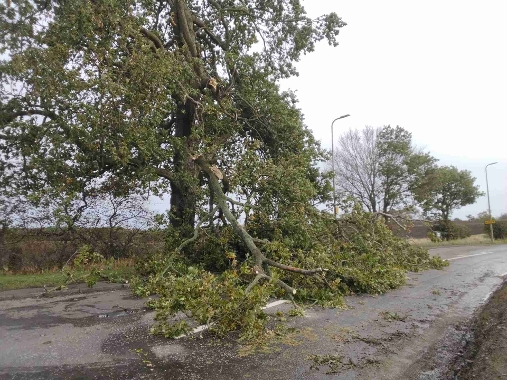
The primary carriageways were pre-treated, then ploughed and gritted in both directions overnight. Due to further accumulations of snow and comparatively low volumes of traffic to spread the salt, driving conditions remained difficult in some areas on Thursday morning.
Further ploughing and gritting of the primary carriageways took place on Thursday morning, with resources then used to treat secondary level 1 carriageways in the afternoon.
The primary carriageways were gritted again yesterday evening and a further reactive treatment was carried out on some routes early this morning following an assessment by the Duty Officer. The forecast is for mainly cold and dry conditions on Friday and Saturday, leading to a risk of harsh frost and icy surfaces.
Gritters will treat the secondary level 1 carriageways today with remaining resources being used to used to treat some secondary level 2 carriageways. Our night drivers will retreat the primary carriageways this evening and overnight.
Additional resources from other council teams are being drafted in to help with snow clearance over the weekend, with further snow showers predicted on Sunday night. Temperatures are expected to improve from Tuesday or Wednesday, which should lead to a wider thaw.
Footway and school gritting has continued, with hand gritting crews deployed to supplement the footpath gritters and to attend to smaller villages with no dedicated vehicle.
Approximately 95% of the 2,500 public grit bins were replenished in advance of Wednesday night's heavy snow, but measures are being put in place to refill them once more as we recognise that many will have been emptied again. It will take some time for all bins to be reached whilst resources are also required to deliver the Winter Service.
To help residents, five additional salt piles have been placed in Blackridge, East Calder, Fauldhouse, Torphichen and Winchburgh, taking the total number to 15. Please see below for a full list.
FAQs below:
Q. Where can I collect grit?
A. Salt piles are available to residents on a self-help basis at the following strategic locations:
• Xcite Centre, McGinley Way, Linlithgow
• Xcite Centre, Church Street, Broxburn
• Livingston North Train Station (South Car Park)
• Livingston South Train Station Car Park
• Xcite Centre, Craigswood, Livingston
• West Calder Business Centre, Dickson Street
• Blackburn Partnership Centre, Ash Grove
• Xcite Centre, Jubilee Road, Whitburn
• Xcite Centre, Torphichen Road, Bathgate
• Xcite Centre, North Street, Armadale
• Craig Inn Community Centre, Main Street, Blackridge
• Xcite Centre, Langton Road, East Calder
• Eastfield Road car park near the bottle banks, Fauldhouse
• Community Centre, Bowyett, Torphichen
• Community Centre, Craigton Place, Winchburgh
Q. Are you refilling grit bins?
A. Our teams have refilled the vast majority of the 2,500 public grit bins in West Lothian this week, but we appreciate many will have been emptied again following further heavy snow. Measures are being put in place to ensure they are refilled as quickly as resources allow.
If you are using a grit bin, please only take what you need. If you see any commercial businesses taking grit, please let us know. We are aware of several incidents where grit bins have been emptied almost immediately.
The grit from grit bins isn't for private use in your own garden or path. If you are using a grit bin, please only take what you need for the public path and public road outside your home. If you require grit for your own property, please purchase grit or salt from a retailer.
Q. How does gritting work?
A. Rock salt lowers the freezing point of moisture on the road surface, stopping ice from forming and causing existing ice or snow to melt. However for salt to work most effectively it requires other vehicles to crush it and spread it across the road. If it snows heavily then snow will still settle on treated surfaces particularly if traffic volumes are relatively low such as during the night or early morning. This explains why driving conditions can remain difficult even though a road has been ploughed and gritted in both directions.
Q. When I drive behind a gritter, they aren't always spreading grit/salt. Why is that?
A. Each gritter has an allocated route to ensure the network is treated as efficiently as possible. A gritter may be tasked with spreading salt on a route in Livingston therefore doesn't start spreading until it reaches that location. Another reason is that a gritter may have used all its salt and is heading back to the depot for a refill.
Q. If I see a gritter that is not moving, why is that?
A. Drivers need to have a break from driving - it's the law. If one of our gritters hasn't moved in a while, this could be the reason why. Alternatively the vehicle may have broken down and is awaiting recovery.
Q. Why do gritter vehicles spend so much time in and around Bathgate?
A. Our depot is in Bathgate so all gritters need to set off from Bathgate, return to re-fuel, load up with more grit and change drivers. Therefore they are in and out of Bathgate, a lot.
Q. Why aren't you gritting housing estates?
A. The council doesn't have the resources to treat all roads simultaneously therefore we need to prioritise. Housing estates are secondary level 2 routes treated on a reactive basis only during normal working hours. These routes will only be treated when the higher priority routes are deemed to be in a satisfactory condition.
Q. What about railway station car parks and other private car parks?
A. The council don't treat private car parks.
Thank you and stay safe everyone.




